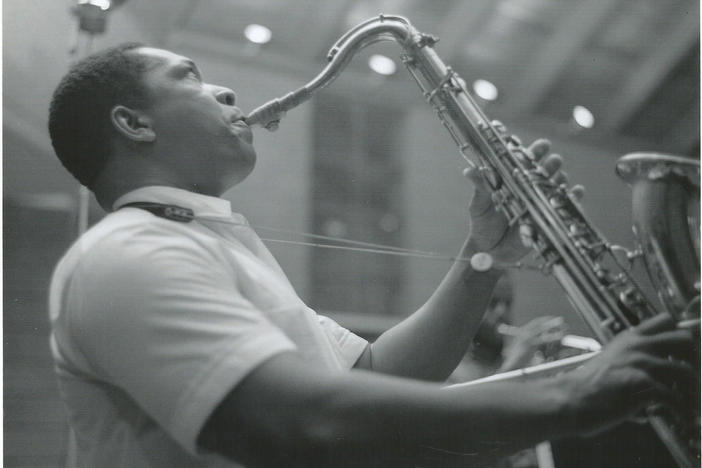Section Branding
Header Content
New Documentary 'Billie' Explores Mysteries Of Billie Holiday And Her Biographer
Primary Content
The film continues writer Linda Kuehl's unfinished investigation into Holiday's life through never-before-heard interviews with jazz luminaries, and explores her experiences with institutional racism.
Transcript
STEVE INSKEEP, HOST:
When Linda Lipnack Kuehl was 14, she heard this voice.
(SOUNDBITE OF SONG, "THE BLUES ARE BREWIN'")
BILLIE HOLIDAY: (Singing) When the moon's kinda dreamy, starry-eyed and dreamy...
INSKEEP: Years later, Kuehl signed a contract to write a biography of Billie Holiday. The author spent nearly a decade on that project. She died before she could finish but left behind interviews with people who knew Holiday. Now we can hear those interviews and see restored footage of Holiday performing in a new documentary. NPR's Elizabeth Blair reports.
ELIZABETH BLAIR, BYLINE: The documentary is like a story within a story. There's Billie Holiday, and there's Linda Lipnack Kuehl's obsession with telling her story. Holiday had died by the time Kuehl started working on her biography. Kuehl's goal was to tell Holiday's story through the voices of the people who knew her - childhood friends, musicians, managers, FBI agents. James Erskine, who directed the documentary, says listening to Kuehl's interviews was like an archaeological journey.
JAMES ERSKINE: What was extraordinary was it felt like we were excavating voices lost to the past to create not just a portrait of Billie, but a portrait of the world. It was so full of atmosphere.
BLAIR: Billie Holiday's cousin talked to Kuehl about growing up poor in Baltimore.
(SOUNDBITE OF DOCUMENTARY, "BILLIE")
JOHN FAGAN: People played on her.
LINDA LIPNACK KUEHL: Did they play on her when she was a kid?
FAGAN: Of course.
KUEHL: Who?
FAGAN: The menfolks.
BLAIR: Kuehl interviewed dozens of musicians, including Count Basie.
(SOUNDBITE OF DOCUMENTARY, "BILLIE")
COUNT BASIE: Well, you interviewing me about my band or Billie Holiday?
KUEHL: Both. I can't write about Billie Holiday with your band if I'm not going to talk about your band.
(SOUNDBITE OF SONG, "NOW OR NEVER")
HOLIDAY: (Singing) Hey there, baby. Make up your mind 'cause I've been waiting such a long, long time.
BLAIR: One of the most arresting moments in the documentary is Kuehl's interview with drummer Jo Jones, who got to know Holiday when they toured together. Jones told Kuehl that as a white woman, she couldn't begin to understand the racism they faced.
(SOUNDBITE OF DOCUMENTARY, "BILLIE")
JO JONES: You don't know what we was going through.
KUEHL: What were you going through?
JONES: We was going through hell. Ms. Billie Holiday didn't have the privilege of using a toilet at a filling station. You don't know anything about it because you never had to subjugate yourself to it - never.
BLAIR: Bassist Charles Mingus talked to Kuehl about Holiday's activism.
(SOUNDBITE OF DOCUMENTARY, "BILLIE")
CHARLES MINGUS: Now, she was fighting equality before Martin Luther King.
KUEHL: How?
MINGUS: Well, look at the songs she chose to sing.
BLAIR: As early as 1939, Billie Holiday sang "Strange Fruit," a haunting indictment of lynching, to Black and white audiences.
(SOUNDBITE OF SONG, "STRANGE FRUIT")
HOLIDAY: (Singing) Southern trees bear strange fruit.
BLAIR: Billie Holiday's voice, wrote Linda Kuehl, was more real and true than anything I'd ever heard before.
(SOUNDBITE OF SONG, "STRANGE FRUIT")
HOLIDAY: (Singing) And blood at the root...
BLAIR: When Kuehl died in 1978, her family recovered the notes, transcripts and 200 hours' worth of interview recordings from her New York apartment. Eventually, they sold the materials to a private collector. Before this documentary, only two biographers were given access to the collection. For the new film, James Erskine interviewed Kuehl's sister, who says Kuehl struggled to finish her book.
(SOUNDBITE OF DOCUMENTARY, "BILLIE")
MYRA LUTTMAN: At one point, I remember we had a discussion when I said, you know, maybe it's just time to finish it and to leave it imperfect. But she couldn't. It was so much part of her.
BLAIR: In the new documentary, "Billie," the range and depth of Kuehl's interviews are finally available for the public to see in theaters and on demand December 4.
Elizabeth Blair, NPR News.
(SOUNDBITE OF SONG, "WHAT'S NEW?")
HOLIDAY: (Singing) What's new? Transcript provided by NPR, Copyright NPR.
Bottom Content



